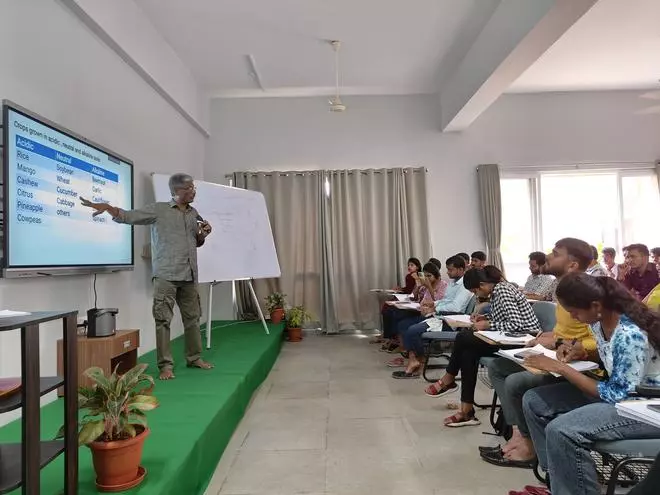For a class of 39 post-graduate students from Shiv Nadar University, NOIDA, it is a different kind of classroom. Very far from their campus, about 1,700 km to be precise, they find themselves in an agricultural field, talking to farmers and other experts in agroecology who earn a livelihood from agri practices. For most of them, it is the first time to meet a farmer and step into a farm field.
Deep in the heart of Andhra Pradesh, an interesting experiment is happening in the field of agricultural education. On a 38-acre organic farm nestled between the towns of Nuzividu and Vissannapeta, the Krishna Sudha Academy for Agroecology is taking root, nurturing a new generation of agricultural thinkers and practitioners.

Students of Shiv Nadar University, NOIDA, learning how to sow the paddy saplings
Founded just last year, the academy is challenging the status quo in agricultural education, prioritising hands-on experience and systemic understanding over theoretical knowledge and top-down solutions.
G.V. Ramanjaneyulu, who has been working in the sustainable agricultural space winning several awards, is driving the academy. Doctor couple, Sudha and Nageswara Rao, who run Dr. Pinnamaneni Siddartha Institute of Medical Sciences & Research Foundation and Drs. Sudha & Nageswara Rao Siddartha Institute of Dental Sciences, and Sree Padmavathi Venkateswara Foundation established the Academy by providing the building and land for the unique experiment in the field of agricultural education.
He’s seen firsthand the struggles of India’s farmers, caught in a cycle of debt and dependence, and he believes the current agricultural education system is failing them.
“The problem is that the system pushes farmers towards a single model of high input agriculture without understanding their specific needs and challenges. There’s a lack of data and research on alternative models, and the focus is on increasing production at any cost, even if it means harming the environment and the farmer’s livelihood,” Ramanjaneyulu, a promoter of the academy, told businessline.

G V Ramanjaneyulu delivering a lecture at Krishna Sudha Academy of Agroecology.
The academy is designed to be different. Instead of classrooms and textbooks, students learn by doing, working side-by-side with experienced farmers on the academy’s working organic farm. They see firsthand the principles of agroecology in action, from biodiversity conservation to rainwater harvesting, and they learn to adapt these principles to different contexts.
Citing the examples of Medical Colleges, IIMs and IITs, he said the institutes rope in industry experts from across verticals for teaching, exposing the students to real-life experiences.
The academy’s vision goes beyond simply teaching sustainable farming practices. It aims to cultivate a new breed of agricultural professionals who understand the interconnectedness of production, institutions, marketing, and public policy. That’s why the academy offers training programmes not just for farmers but also for extension workers, researchers, and even bankers.
He said bankers involved in agricultural lending should comprehend the nuisances involved in farming and the associated issues involved. “Unless they understand them fully, they won’t appreciate the needs of farmers,” he points out.
“We need to build a system where everyone involved in agriculture is working together towards a common goal,” Ramanjaneyulu emphasises.
“That means fostering collaboration between universities, government agencies, and the private sector,” he says.
The academy is already making strides in this direction. It has established partnerships with several universities, including Shivanadar University, offering students internships and research opportunities at the farm. It is also working with the National Centre for Organic and Natural Farming to develop training programmes for government extension staff.
And the academy’s influence extends beyond India’s borders. It has forged international partnerships with organisations like the University of Edinburgh, the University of York, Monash University, and the Research Institute of Organic Agriculture (FiBL) in Switzerland, sharing knowledge and best practices with a global network of agroecology advocates.
By reimagining agricultural education, the academy is trying to sow the seeds of change, cultivating a future where farming is both sustainable and profitable.





Comments
Comments have to be in English, and in full sentences. They cannot be abusive or personal. Please abide by our community guidelines for posting your comments.
We have migrated to a new commenting platform. If you are already a registered user of TheHindu Businessline and logged in, you may continue to engage with our articles. If you do not have an account please register and login to post comments. Users can access their older comments by logging into their accounts on Vuukle.